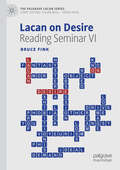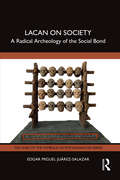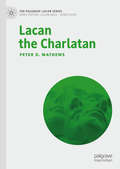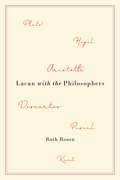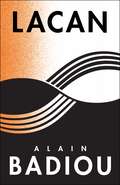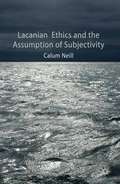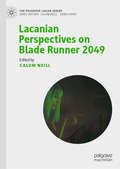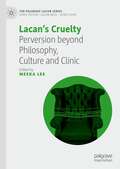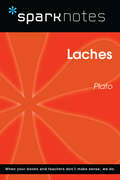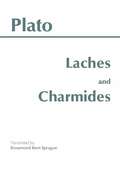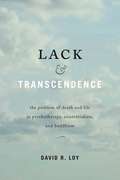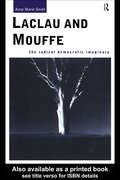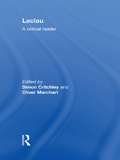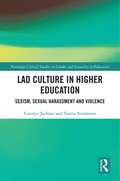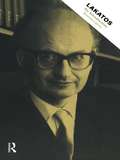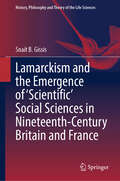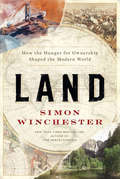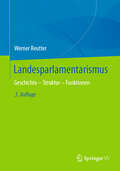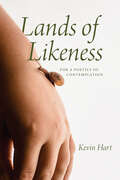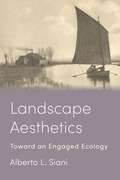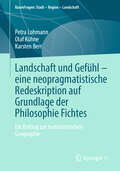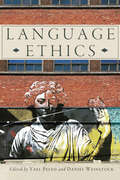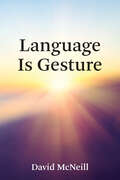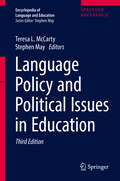- Table View
- List View
Lacan on Desire: Reading Seminar VI (The Palgrave Lacan Series)
by Bruce FinkThis companion to Lacan’s Seminar VI guides readers through an examination of desire, fantasy, dream interpretation, death, object a, and the signifier of the lack in the Other as they are elaborated by Lacan. Bruce Fink draws on his extensive experience as a practicing analyst and as a leading translator of Lacan’s work (including Seminar VI), in this highly accessible exploration which includes both close textual analysis and illustrative clinical vignettes. Seminar VI, Desire and Its Interpretation, and Fink’s discussion of it here constitute a timely intervention for clinicians, for whom an engagement with desire is pivotal to the direction of the treatment, and for students and scholars interested in philosophy, sociology, anthropology, comparative literature, art, film, and social and political theory, for whom desire, fantasy, and object a may be useful conceptual tools. Combining rigorous analysis and a clear writing style, this guide provides an invaluable new resource.
Lacan on Society: A Radical Archeology of the Social Bond (The Lines of the Symbolic in Psychoanalysis Series)
by Edgar Miguel Juárez-SalazarLacan on Society is an exhaustive archeological and contingent review of Lacan’s approaches to society throughout his work, seminars, and écrits.Through a systematic and chronological analysis of Lacan’s work, Edgar Miguel Juárez-Salazar highlights critical, structural, and divergent surfaces as they emerge within the concept of society. The book explores diverse manifestations of society to conjugate social and structural phenomena such as ideals, the metamorphoses of social enjoyment, the structural demand to produce social order, and the political economy of the signifier and its abstract circulation. Juárez-Salazar’s work evaluates Lacan's critique of the notion of the family complexes, the relation between society and social modes of enjoyment, and the homology between Marx and Lacan, concluding with an invitation to subvert the understanding of society and its diatribes.Lacan on Society will be of great interest to academics and scholars of psychoanalysis, critical theory and Lacanian studies. It will also be relevant to academics and scholars of political economy, cybernetics, post-Marxist thought, gender studies and sociology.
Lacan the Charlatan (The Palgrave Lacan Series)
by Peter D. MathewsThis book sets out to determine the validity of an accusation made against Jacques Lacan by Noam Chomsky in an interview in 1989. He stated that Lacan was a “charlatan” – not that his ideas were flawed or wrong, but that his entire discourse was fraudulent, an accusation that has since been repeated by many other critics. Examining the arguments of key anti-Lacanian critics, Mathews weighs and contextualizes the legitimacy of Lacan’s engagements with structural linguistics, mathematical formalization, science, ethics, Hegelian dialectics, and psychoanalysis. The guiding thread is Lacan’s own recurrent interrogation of authority, which inhabits an ambiguous zone between mastery and charlatanry. This book offers a novel contribution to the field for students and scholars of psychoanalysis, philosophy, sociology, critical and literary theory.
Lacan with the Philosophers
by Ruth RonenClosely examining Jacques Lacan's unique mode of engagement with philosophy, Lacan with the Philosophers sheds new light on the interdisciplinary relations between philosophy and psychoanalysis. While highlighting the philosophies fundamental to the study of Lacan’s psychanalysis, Ruth Ronen reveals how Lacan resisted the straightforward use of these works. Lacan’s use of philosophy actually has a startling effect in not only providing exceptional entries into the philosophical texts (of Aristotle, Descartes, Kant and Hegel), but also in exposing the affinity between philosophy and psychoanalysis around shared concepts (including truth, the unconscious, and desire), and at the same time affirming the irreducible difference between the analyst and the philosopher. Inspired by Lacan’s resistance to philosophy, Ruth Ronen addresses Lacan’s use of philosophy to create a fertile moment of exchange. Straddling the fields of philosophy and psychoanalysis with equal emphasis, Lacan with the Philosophers develops a unique interdisciplinary analysis and offers a new perspective on the body of Lacan’s writings.
Lacan: Anti-Philosophy 3 (The Seminars of Alain Badiou)
by Alain BadiouAlain Badiou is arguably the most significant philosopher in Europe today. Badiou’s seminars, given annually on major conceptual and historical topics, constitute an enormously important part of his work. They served as laboratories for his thought and public illuminations of his complex ideas yet remain little known. This book, the transcript of Badiou’s year-long seminar on the psychoanalytic theory of Jacques Lacan, is the first volume of his seminars to be published in English, opening up a new and vital aspect of his thinking.In a highly original and compelling account of Lacan’s theory and therapeutic practice, Badiou considers the challenge that Lacan poses to fundamental philosophical topics such as being, the subject, and truth. Badiou argues that Lacan is a singular figure of the “anti-philosopher,” a series of thinkers stretching back to Saint Paul and including Kierkegaard and Nietzsche, with Lacan as the last great anti-philosopher of modernity. The book offers a forceful reading of an enigmatic yet foundational thinker and sheds light on the crucial role that Lacan plays in Badiou’s own thought. This seminar, more accessible than some of Badiou’s more difficult works, will be profoundly valuable for the many readers across academic disciplines, art and literature, and political activism who find his thought essential.
Lacanian Ethics and the Assumption of Subjectivity
by Calum NeillHowever we conceive of ethics, whether by appeal to an exterior or traditional notion of right and wrong, or by appeal to some form of individual virtue or responsibility, it implies some form of agency. Where there is an ethical act, there must be someone acting ethically. Working from this simple premise, this book argues that the manner in which we conceive that 'someone' is the condition of possibility for our conception of ethics and, consequently, our ethical potential. Against the commonplace conception of the modern individual as self-identical, self-aware and self-governing, theauthor presents a detailed introduction to the Lacanian subject, a conception of the self as anything but self-identical, self-aware and self-governing. The book goes on to show how such a rethinking of the subject necessitates a rethinking of our relation to law, tradition and morality, as well as a rethinking of our understanding of guilt, responsibility and desire. In short, it necessitates a rethinking of ethics. "
Lacanian Perspectives on Blade Runner 2049 (The Palgrave Lacan Series)
by Calum NeillThis book provides a collection of Lacanian responses to Denis Villeneuve’s Blade Runner 2049 from leading theorists in the field. Like Ridley Scott’s original Blade Runner film, its sequel is now poised to provoke philosophical and psychoanalytic arguments, and to provide illustrations and inspiration for questions of being and the self, for belief and knowledge, the human and the post-human, amongst others. This volume forms the vanguard of responses from a Lacanian perspective, satisfying the hunger to extend the theoretical considerations of the first film in the various new directions the second film invites. Here, the contributors revisit the implications of the human-replicant relationship but move beyond this to consider issues of ideology, politics, and spectatorship. This exciting collection will appeal to an educated film going public, in addition to students and scholars of Lacanian psychoanalysis, psychoanalytic theory, cultural studies, film theory, philosophy and applied psychoanalysis.
Lacan’s Cruelty: Perversion beyond Philosophy, Culture and Clinic (The Palgrave Lacan Series)
by Meera LeeThis collection, written by leading Lacanian psychoanalytic theorists and practitioners, is a unique exploration of the novel aspects of perversion from the perspective of cruelty—a psychoanalytic study that has never been sufficiently undertaken in an English-speaking world. Instead of reducing the notion of perversion to cultural representations, a historical discourse or a clinical diagnosis, the authors in this collection draw on Freud, Kant, Hegel, Marquis de Sade, Derrida, Deleuze and Žižek to untie the knot of “psychic cruelty” intrinsic to perversion and therefore “de-sexualize” perverted acts. They do so by theorizing perversion in psychoanalytic concepts of the Oedipus complex, the-Name-of-the-Father and jouissance, and furthermore in the perspective of the clinics of neurosis and psychosis, in dialogue with a clinical praxis, philosophy and literature.
Laches (SparkNotes Philosophy Guide)
by SparkNotesLaches (SparkNotes Philosophy Guide) Making the reading experience fun! SparkNotes Philosophy Guides are one-stop guides to the great works of philosophy–masterpieces that stand at the foundations of Western thought. Inside each Philosophy Guide you&’ll find insightful overviews of great philosophical works of the Western world.
Laches and Charmides
by Plato Rosamond Kent SpragueRosamond Kent Sprague's translations of the Laches and Charmides are highly regarded, and relied on, for their lucidity and philosophical acuity. This edition includes notes by Sprague and an updated bibliography.
Lack & Transcendence: The Problem of Death and Life in Psychotherapy, Existentialism, and Buddhism
by David R. LoyLoy draws from giants of psychotherapy and existentialism, from Nietzsche to Kierkegaard to Sartre, to explore the fundamental issues of life, death, and what motivates us.Whatever the differences in their methods and goals, psychotherapy, existentialism, and Buddhism are all concerned with the same fundamental issues of life and death—and death-in-life. In Lack and Transcendence (originally published by Humanities Press in 1996), David R. Loy brings all three traditions together, casting new light on each. Written in clear, jargon-free style that does not assume prior familiarity, this book will appeal to a wide variety of readers including psychotherapists and psychoanalysts, scholars of religion, Continental philosophers, and readers seeking clarity on the Great Matter itself. Loy draws from giants of psychotherapy, particularly Freud, Rollo May, Irvin Yalom, and Otto Rank; great existentialist thinkers, particularly Nietzsche, Kierkegaard, Heidegger, and Sartre; and the teachings Buddhism, particularly as interpreted by Nagarjuna, Huineng and Dogen. This is the definitive edition of Loy’s seminal classic.
Lack of Character
by John M. DorisThis book is a provocative contribution to contemporary ethical theory challenging foundational conceptions of character that date back to Aristotle. John Doris draws on behavioral science, especially social psychology, to argue that we misattribute the causes of behavior to personality traits and other fixed aspects of character rather than to the situational context. More often than not it is the situation not the nature of the personality that really counts. The author elaborates the philosophical consequences of this research for a whole array of ethical theories and shows that, once rid of the misleading conception of motivation, moral psychology can support more robust ethical theories and more humane ethical practices.
Laclau and Mouffe: The Radical Democratic Imaginary
by Anna Marie SmithLaclau and Mouffe: The Radical Democratic Imaginary is the first full-length overview of the important work of Ernesto Laclau and Chantal Mouffe. Anna Marie Smith clearly shows how Laclau and Mouffe's work has brought Gramscian, poststructuralist and psychoanalytic perspectives to revitalize traditional political theory. With clarity and insight, she shows how they have constructed a highly effective theory of identity formation and power relations that carefully draws from the criticism of political theory from postmodern anti-foundationalist political theory.
Laclau: A Critical Reader
by Simon Critchley Oliver MarchartLaclau: A Critical Reader is the first full-length critical appraisal of Laclau's work and includes contributions from several leading philosophers and theorists. The first section examines Laclau's theory that the contest between universalism and particularism provides much of the philosophical background to political and social struggle, taking up the important place accorded to, amongst others, Hegel and Lacan in Laclau's work. The second section of the book considers what Laclau's 'radical democracy' might look like and reflects on its ethical implications, particularly in relation to Laclau's post-Marxism and thinkers such as Jürgen Habermas. The final section investigates the place of hegemony in Laclau's work, the idea for which he is perhaps best-known.This stimulating collection also includes replies to his critics by Laclau and the important exchange between Laclau and Judith Butler on equality, making it an excellent companion to Laclau's work and essential reading for students of political and social theory.
Lad Culture in Higher Education: Sexism, Sexual Harassment and Violence (Routledge Critical Studies in Gender and Sexuality in Education)
by Vanita Sundaram Carolyn JacksonResponding to increasing concerns about the harmful effects of so-called ‘lad culture’ in British universities, and related ‘bro’ and ‘frat’ cultures in US colleges, this book is the first to explore and analyse the perspectives of university staff on these cultures, which students suggest foster the normalisation of sexism, homophobia, racism, sexual harassment and violence. Drawing on in-depth interviews with a broad range of staff and faculty across different types of universities in England, the book explores the following key questions: What is lad culture? How and where is it manifest in higher education and what are the effects on students and staff? How can ‘laddish’ behaviour be explained? How can we theorise lad culture to enable us to better understand and challenge it? How do dynamics in the United Kingdom compare to so-called ‘bro’ and ‘frat’ cultures in US colleges? By examining the ways in which lad culture is understood and explained, the authors illustrate that current understandings of lad culture obscure the broader processes through which problematic attitudes, practices, and educational climates are fostered. This analysis enables a theorisation of lad culture that makes visible the gendered norms and intersecting structural inequalities that underpin it. This timely and accessible volume will be of great interest to anyone looking to understand and tackle sexism, sexual harassment and violence in and beyond university contexts. It will be of particular significance to researchers, undergraduate and postgraduate students, academics, and policy makers in the fields of gender and sexuality in education, higher education, and sociology of education.
Lakatos: An Introduction
by Brendan LarvorLakatos: An Introduction provides a thorough overview of both Lakatos's thought and his place in twentieth century philosophy. It is an essential and insightful read for students and anyone interested in the philosophy of science.
Lamarckism and the Emergence of 'Scientific' Social Sciences in Nineteenth-Century Britain and France (History, Philosophy and Theory of the Life Sciences #36)
by Snait B. GissisThe book presents an original synthesizing framework on the relations between ‘the biological’ and ‘the social’. Within these relations, the late nineteenth-century emergence of social sciences aspiring to be constituted as autonomous, as 'scientific' disciplines, is described, analyzed and explained. Through this framework, the author points to conceptual and constructive commonalities conjoining significant founding figures – Lamarck, Spencer, Hughlings Jackson, Ribot, Durkheim, Freud – who were not grouped nor analyzed in this manner before. Thus, the book offers a rather unique synthesis of the interactions of the social, the mental, and the evolutionary biological – Spencerian Lamarckism and/or Neo-Lamarckism – crystallizing into novel fields. It adds substantially to the understanding of the complexities of evolutionary debates during the last quarter of the nineteenth century. It will attract the attention of a wide spectrum of specialists, academics, and postgraduates in European history of the nineteenth century, history and philosophy of science, and history of biology and of the social sciences, including psychology.
Land: How the Hunger for Ownership Shaped the Modern World
by Simon Winchester“In many ways, Land combines bits and pieces of many of Winchester’s previous books into a satisfying, globe-trotting whole. . . . Winchester is, once again, a consummate guide.”—Boston GlobeThe author of The Professor and the Madman, The Map That Changed the World, and The Perfectionists explores the notion of property—bought, earned, or received; in Europe, Africa, North America, or the South Pacific—through human history, how it has shaped us and what it will mean for our future.Land—whether meadow or mountainside, desert or peat bog, parkland or pasture, suburb or city—is central to our existence. It quite literally underlies and underpins everything. Employing the keen intellect, insatiable curiosity, and narrative verve that are the foundations of his previous bestselling works, Simon Winchester examines what we human beings are doing—and have done—with the billions of acres that together make up the solid surface of our planet.Land: How the Hunger for Ownership Shaped the Modern World examines in depth how we acquire land, how we steward it, how and why we fight over it, and finally, how we can, and on occasion do, come to share it. Ultimately, Winchester confronts the essential question: who actually owns the world’s land—and why does it matter?
Landesparlamentarismus: Geschichte - Struktur - Funktionen
by Werner ReutterDieser Band bietet eine Bestandsaufnahme der Funktionsweisen, der Aufgaben und der Stellung der Landesparlamente in den einzelnen Bundesländern. Er informiert über die historische Entwicklung und verfassungsrechtlichen Voraussetzungen der 16 Landesparlamente, stellt die jeweiligen Parteienlandschaften, das Wahlrecht und die Wahlergebnisse vor, analysiert die politische und soziale Zusammensetzung sowie die Struktur und Organisation der Landesparlamente und untersucht schließlich den Funktionswandel dieser Institutionen. Für die 3. Auflage wurde er umfassend aktualisiert und erweitert.
Lands of Likeness: For a Poetics of Contemplation
by Kevin HartAn original and profound exploration of contemplation from philosopher, theologian, and poet Kevin Hart. In Lands of Likeness, Kevin Hart develops a new hermeneutics of contemplation through a meditation on Christian thought and secular philosophy. Drawing on Kant, Schopenhauer, Coleridge, and Husserl, Hart first charts the emergence of contemplation in and beyond the Romantic era. Next, Hart shows this hermeneutic at work in poetry by Gerard Manley Hopkins, Marianne Moore, Wallace Stevens, and others. Delivered in its original form as the prestigious Gifford Lectures, Lands of Likeness is a revelatory meditation on contemplation for the modern world.
Landscape Aesthetics: Toward an Engaged Ecology
by Alberto L. SianiThe notion of landscape typically seems innocuous, associated with leisure and contemplation. Likewise, aesthetics is often seen as apolitical, a matter of subjective tastes and preferences. This book challenges the common understanding of these categories as disengaged and demonstrates how uniting landscape studies and philosophical aesthetics opens new ways of addressing both the environmental crisis and the crisis of the humanities.Alberto L. Siani argues that the concept of landscape helps us overcome deeply ingrained oppositions, such as nature and culture, spirit and flesh, or the environment and the human. Landscape represents the intersection of these categories and therefore provides a helpful vantage point on contemporary predicaments that cannot be understood within dualistic frameworks. An engaged aesthetics shows that landscapes are not simply ways of seeing the world but ways of being in the world, offering practical guidance for inhabiting places ethically. Landscape Aesthetics sheds new light on issues spanning art and its interpretation, environmentalism, temporality, lived spaces, justice, education, and interdisciplinarity. Bringing together a wide range of sources across philosophy and other disciplines as well as personal experience, Siani reveals the key role of landscape and aesthetics in responding to the pressing crises we face today.
Landschaft und Gefühl – eine neopragmatistische Redeskription auf Grundlage der Philosophie Fichtes: Ein Beitrag zur humanistischen Geographie (RaumFragen: Stadt – Region – Landschaft)
by Olaf Kühne Karsten Berr Petra LohmannDie Befassung mit ‚Landschaft‘ hat in den letzten Jahren in der Öffentlichkeit und den Wissenschaften an Bedeutung gewonnen. In Philosophie, Humangeographie und Sozialwissenschaften haben sich unterschiedliche Traditionen im Umgang mit ‚Landschaft‘ entwickelt. Diese werden in dem vorliegenden Buch hinsichtlich ihrer Tauglichkeit für einen Beitrag zur Analyse und Regelung von Landschaftskonflikten und daraufhin untersucht, Antworten auf die landschaftsbezogenen Herausforderungen der Gegenwart sowohl in Bezug auf Wissenschaft als auch Gesellschaft zu leisten. Zentraler Ansatzpunkt ist die Erörterung des Selbstverhältnisses des Individuums im Konflikt, die im Rückgriff auf Fichtes Theorie des Gefühls im Rahmen einer Philosophie des Subjekts erfolgt. Mit dieser Theorie soll insbesondere die Einseitigkeit wissenschaftlicher Zugänge zum Individuum angegangen werden, die einerseits in der überproportionalen Betonung der Ratio und andererseits in der fehlenden Verortung des Gefühls zuallererst im Individuum selbst besteht. Die mangelnde Beachtung der Binnenperspektive des Individuums im Konflikt führt zu einer Bedeutungsferne des Konflikts für das Individuum sowie infolgedessen zur Verunklarung der konfliktären Situation und damit letztlich Unfähigkeit sinnvollen Handelns bezogen auf die Regelung eines solchen Konflikts. Mit diesem Zugang erweitern wir den sich aktuell in Entwicklung befindlichen neopragmatistischen Ansatz der Landschaftsforschung und stellen die Bedeutung eines humanistischen Ansatzes zu Landschaft heraus, der den Menschen als fühlendes und sittliches Wesen in das Zentrum der Überlegungen stellt. Damit leistet das Buch einen Beitrag zur Redeskription der humanistischen Geographie.
Language Ethics
by Yael Peled and Daniel M. WeinstockLanguage is central to political philosophy, yet until now there has been little in the way of a common framework capable of bridging disciplines that share an interest in language, power, and ethics. Studies are predominantly carried out in isolated disciplinary silos - notably linguistics, philosophy, political science, public administration, and education. This volume proposes a new vision for understanding the political ethics of language, particularly in linguistically diverse societies, and it establishes the necessary common framework for this field of inquiry: language ethics. Through creative and constructive thinking, Language Ethics considers how to advance our understanding of the human commonalities of moral and linguistic capacities and the challenge of linguistic difference and societal interdependence. The book embraces the longstanding centrality of language to moral reasoning and reinterprets it in a manner that draws on the social and political life of real-world inter- and intralinguistic issues. Contributors to this collection are leading international experts from different disciplines and approaches whose voices add diverse insight to the discourse on ethics and language justice. Exploring social, political, and economic realities, Language Ethics illuminates the complex nexus between ethics and language and highlights the contemporary challenges facing multilingual societies, including the uncertainties, ambiguities, anxieties, and hopes that accompany them.
Language Is Gesture
by David McNeillA new way of viewing language, as a dynamic mode of meaning-making of which gesture is a fundamental part.When David McNeill began his work on gesture more than forty years ago, language and the action of speaking were regarded as separate realms. But language, says McNeill in Language Is Gesture, is dynamic and gesture is fundamental to speaking. Central to his conception of language, and distinct from linguistic analysis, is what McNeill calls the &“growth point,&” the starting point of making thought and speech one. He uses the term &“gesture–speech unity&” to refer to the dynamic dimension of adding gesture to speaking. It is the growth point that achieves this unity, whereby thought is embedded in gesture and speech at the same time.Gesture is the engine of language. It is foundational to speaking, language acquisition, the origin of language, animal communication, thought, and consciousness. Gesture is global and synthetic and brings energy; speech is linear and segmented and brings cultural standards. The growth point is a snapshot of an utterance at its beginning psychological stage, the starting point of unifying thought and speech. Growth points create gesture–speech unity by synchronizing a bundle of linguistic features with a gesture that carries the same meaning. This gesture–speech unity is a form of thought, a unique form of cognition.
Language Policy and Political Issues in Education
by Teresa L. Mccarty Stephen MayLanguage has too often been studied in isolation from the social and political conditions in which it is used. The late David Corson, the General Editor of the first edition of the Encyclopedia of Language and Education, held the position that an acute understanding of theory was a necessary prerequisite for action, not an alternative to it, especially if one were hoping to change policies for the better. The contributions in this volume acknowledge the centrality of the politics of language, highlighting the importance of the social and political contexts of language policy and language education. This is one of ten volumes of the Encyclopedia of Language and Education. The Encyclopedia bears testimony to the dynamism and evolution of the language and education field, as it confronts the ever-burgeoning and irrepressible linguistic diversity and ongoing pressures and expectations placed on education around the world.
